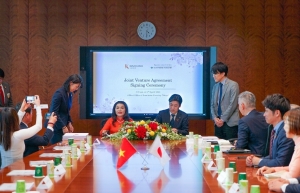Lenders must embrace responsibility to real estate
Some say that Vietnam should study and apply China’s real estate rescue policy. What’s your take on this?
I want to emphasise that Vietnam’s real estate market is very different from that of China. Vietnam’s real estate is a market that lacks supply, while the demand is large both in the short and long term. In the past five years, the licensing and implementation of projects has decreased sharply. Especially in the last two years, there have been almost no new projects launched, leading to an increasingly scarce supply of residential real estate.
 |
| Dr. Le Xuan Nghia, member of the National Financial and Monetary Policy Advisory Council |
If the legal process is good, and if there are projects and resources at a reasonable price, the demand will be huge. For example, if an apartment of about $1,000-1,280 per square metre or less can borrow 60-70 per cent, the demand will be huge. In other words, even if the market can establish a new price level, the price level will continue to increase and policymakers will expect a stable and acceptable increase.
Moreover, it is this new price level that will restructure the real estate market in the most effective way and at that time, any business or investor who can stand this price level will survive. If not, then they will have to restructure their own corporations according to market principles.
Therefore, the opportunity to solve difficulties in real estate in Vietnam is quite high compared to China. This country solved three problems – legal procedures, accelerating projects, and lending special credit to healthy businesses to buy weak projects – but, in the end, it encountered another big obstacle, which is that sometimes people have no need.
China’s financial watchdog launched a 16-point plan to energise the real estate market, including a special credit package to rescue businesses. However, actual developments show that the Chinese real estate market is still in a difficult situation. It is still something Vietnam can learn from.
After the nationwide conference on the safe and sustainable development of the real estate market, Prime Minister Pham Minh Chinh emphasised the priority of bank credit for the recovery and development of affordable housing and social housing. What do you think about this direction?
I think this is a very sharp guiding thought, in line with the current reality of the market. The state budget is not enough to finance all segments and it is impossible to finance businesses.
Furthermore, we cannot entice commercial banks into a market with certain risks. In other words, a shield is needed for the banking system because this is the lifeblood of the economy and depositors’ trust plays a decisive role in the existence and development of the macroeconomy and the financial market in general and the banking system in particular.
Solving the problem of capital flows for real estate must focus on prioritising bank credit capital to restore and develop affordable housing and social housing. This is important and creates a prioritised segment for restructuring.
Looking at the current market reality, the segment that needs a massive supply which is not available is affordable housing and social housing because there is no mechanism, land, or capital flow. I believe that, when focusing resources on this segment, it will create a new price level and help the market recover and thrive again.
How will the banking system play a significant role in supporting the real estate market to develop sustainably again?
I think that commercial banks can carefully consider and analyse the financial background of each real estate group. They can carry out a comprehensive assessment of collateral or potential security assets and short- and medium-term debt repayment ability, and the ability of the management board, to decide on debt restructuring. After that, new loans can be crafted to both investors and buyers at a reasonable price. This is also to ensure that the restructuring of the real estate market must be a selective restructuring.
My view is that it takes a very realistic view of the market to solve two problems. First, it determines the price to restructure corporate bond debt according to the orientation of revised legislation, which includes negotiating with investors on asset swaps to liquidate corporate bonds, and liquidation of projects to repay debts. Where assets with high solvency are seriously impaired, the enterprise must go bankrupt.
Secondly, businesses cannot just sit and wait, but need to make efforts to self-advocate, or even to accept liquidation of assets to handle their debts.
The management policies of the state play an important role in restoring the real estate market. What is your expectation about the early realisation of these supporting policies in reality?
On the state side, I expect stronger actions, requesting local governments to review land planning related to the real estate market and resolve issues promptly and decisively regarding procedures for projects. Specifically, there must be valuation of site clearance compensation, tax valuation for land use rights, and bidding needs to be carried out quickly so that projects can start construction quickly.
 | Sumitomo Forestry partners with Kim Oanh Group Sumitomo Forestry Group and Kim Oanh Group signed a strategic cooperation agreement in early April to establish KS Sustainable Development JSC, for the development of large-scale real estate projects. |
 | Removing bottlenecks in real estate market Capital flow, legal bottlenecks, and removing policy obstacles in real estate are the main issues to be discussed by policymakers and experts in a roundtable themed held by Vietnam Investment Review on April 19. |
 | Gamuda Land’s strategic regional expansion Malaysian real estate developer Gamuda Land has been expanding its quick turnaround project strategy to deliver higher returns. Angus Liew, chairman of Gamuda Land Vietnam, exclusively shared the group’s development strategies with VIR’s Bich Ngoc. |
 | Real estate must be allowed to connect robust value chains The real estate market is a bridge connecting industries and markets in the real estate value chain. Specifically, there are 35 industries and fields related to the real estate market, with the coefficient of diffusion from 0.5 to 1.7 times. |
What the stars mean:
★ Poor ★ ★ Promising ★★★ Good ★★★★ Very good ★★★★★ Exceptional
Related Contents
Latest News
More News
- Citi economists project robust Vietnam economic growth in 2026 (February 14, 2026 | 18:00)
- Sustaining high growth must be balanced in stable manner (February 14, 2026 | 09:00)
- From 5G to 6G: how AI is shaping Vietnam’s path to digital leadership (February 13, 2026 | 10:59)
- Cooperation must align with Vietnam’s long-term ambitions (February 13, 2026 | 09:00)
- Need-to-know aspects ahead of AI law (February 13, 2026 | 08:00)
- Legalities to early operations for Vietnam’s IFC (February 11, 2026 | 12:17)
- Foreign-language trademarks gain traction in Vietnam (February 06, 2026 | 09:26)
- Offshore structuring and the Singapore holding route (February 02, 2026 | 10:39)
- Vietnam enters new development era: Russian scholar (January 25, 2026 | 10:08)
- 14th National Party Congress marks new era, expands Vietnam’s global role: Australian scholar (January 25, 2026 | 09:54)

 Tag:
Tag:



















 Mobile Version
Mobile Version